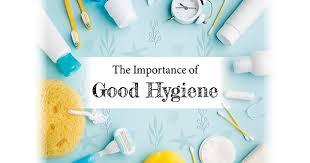What is personal hygiene?
Good personal hygiene is about keeping your body clean. It also helps to protect you from getting infections such as gastroenteritis, colds and flu and COVID-19.
Washing your hands with soap removes germs that can make you ill. Having good personal hygiene will also help prevent you from spreading diseases to other people.
Personal hygiene includes:
- cleaning your body every day
- washing your hands with soap and water after going to the toilet
- brushing and flossing your teeth twice a day
- covering your mouth and nose with a tissue (or your sleeve) when sneezing or coughing
- washing your hands after handling pets and other animals
Why is personal hygiene important?
Good personal hygiene is vital because it helps stop you from getting sick. It also helps stop you from spreading germs and infectious diseases.
The germs that cause many diseases can be passed on by:
- touching other people
- getting faeces (poo) or other body fluids on your hands
- handling contaminated food
- coming into contact with dirty surfaces or objects
Conditions that you can develop if you have poor personal hygiene include:
- COVID-19 and other infectious diseases
- diarrhoea, especially gastroenteritis
- respiratory infections, including colds and flu
- scabies
- staph infections
- tinea or athlete's foot
- tooth decay
- trachoma, an eye infection which can lead to blindness
- threadworms and other worms
When should I wash my hands?
Washing your hands often is a good way to stop the germs on your hands from making you sick.
It is important to wash your hands after going to the toilet.
Also, wash your hands:
- when they are obviously dirty
- after touching rubbish, dirty surfaces or objects
- before and after preparing or eating food
- after blowing your nose
- after handling pets or animals
- after changing a baby's nappy
- before and after visiting someone who is sick
- after cleaning up vomit or body fluids
- before and after treating cuts or wounds
How do I wash my hands?
To avoid getting sick, wash your hands properly.
- Wet your hands with clean water.
- Apply enough soap to cover all surfaces of your hands.
- Rub your hands together for at least 20 seconds.
- Clean between your fingers and the backs of your hands.
- Clean dirty fingernails with a nail brush.
- Rinse both sides of your hands with clean water.
- Dry off your hands with a clean towel.
- If you're in a public bathroom, use paper towel to turn off the tap.
If soap and water aren't available, you can use hand sanitiser. The hand sanitiser should contain at least 60% alcohol.
Rub the sanitiser over your palms, the backs of the hands and in between your fingers. Keep rubbing until it is dry.
Find out more here about hand washing.
Washing your body
Try to bathe or shower often. This helps prevent infections and body lice.
Wash well, especially under your armpits and around your genitals (vulva or penis) and anus.
Keeping clean will remove bacteria that cause body odour (BO). It is especially important to shower or bathe after vigorous exercise.
Use a soapy washcloth to clean your body. Start cleaning your head and face. Then continue to your arms, chest, abdomen (tummy) and back. Finally clean your legs, genitals, and buttocks.
You can use soap, shower gel or a hypoallergenic body wash. While soap removes more germs, you may need to use plain water or salt water on sensitive body parts.
Washing your genitals
Most people know more about hair care than caring for their genitals.
Penis care
If you have a foreskin (are uncircumcised) you have some extra things to think about when washing your penis.
You should clean your penis by:
- gently pulling back the foreskin
- washing underneath it with warm water and a gentle soap
After washing, pull the foreskin forward to its normal position. See more here about penis care.
Vulva care
You can gently wash the delicate skin around your vulva using your hands and a mild soap.
Avoid perfumed soaps and bath products as these may irritate the sensitive skin of your vulva.
Do not clean inside your vagina or douche. This is because it upsets the healthy bacteria that live in your vagina.
Preventing body odour
The simplest way to get rid of body odour (BO) is to shower or bath regularly. This gets rid of the bacteria on your skin.
Using soap when you wash helps to control the naturally occurring bacteria.
After washing, make sure that you dry yourself well. Apply deodorant to your armpits. Deodorants help make your armpits less friendly to bacteria and hide odours. Antiperspirants help block your sweat glands to reduce sweating.
Put on clean, dry clothing. Wearing clothes made from natural fibres such as cotton, silk and wool can keep you dry. Wash your clothes often and, if possible, hang them outdoors to dry.
If you have a problem with sweating too much, make an appointment to see your doctor.
Preventing tooth decay and bad breath
Bad breath can be caused by poor oral hygiene. You can help prevent tooth decay and improve your oral hygiene by:
- brushing your teeth twice a day with a soft toothbrush and fluoride toothpaste
- cleaning between your teeth with dental floss or interdental brushes every day
- having regular dental check-ups
Use these dental care tips to reduce your chance of getting gum disease and tooth decay in the future.

